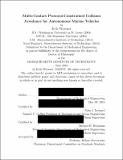Multi-contact protocol-constrained collision avoidance for autonomous marine vehicles
Author(s)
Woerner, Kyle
DownloadFull printable version (15.79Mb)
Other Contributors
Massachusetts Institute of Technology. Department of Mechanical Engineering.
Advisor
John J. Leonard and Michael R. Benjamin.
Terms of use
Metadata
Show full item recordAbstract
The field of autonomous collision avoidance has continued to advance in many areas including sensory and perception, navigation, payload integration, and collision avoidance. The advances in collision avoidance, however, have largely focused on iterative changes to the velocity obstacle - an algorithm that inherently loses important collision avoidance information key to replicating a human-like decision space. This thesis examines algorithms that generalize the traditional velocity obstacle into a multi-threshold based approach that more realistically represent and evaluate human ship driving practices. Novel protocol-constrained collision avoidance evaluation algorithms are proposed including the ability to perform both on-line and post-mission analysis of both robots and humans. These algorithms become especially important when considering complex missions of competing objectives in a contact-dense, protocol-constrained collision avoidance environment. Introduction of competing performance metrics consistent with human ship driving practices allows autonomous collision avoidance algorithm designers to consider previously unexplored tradespaces. On-water results of up to five simultaneously interacting autonomous vessels validate the collision avoidance algorithms using four key areas of evaluation: spatial efficiency, temporal efficiency, protocol compliance, and safety. Testing of 10 complex scenarios totaled over 6,150 vehicle-pair on-water encounters. Human-robot field experimentation demonstrated autonomous collision avoidance performance under conflicting protocol requirements of COLREGS while interacting with human-driven vessels. An autonomous collision avoidance "road test" framework is proposed to incorporate testing of arbitrary collision avoidance algorithms both in the field and in simulation.
Description
Thesis: Ph. D., Massachusetts Institute of Technology, Department of Mechanical Engineering, 2016. This electronic version was submitted by the student author. The certified thesis is available in the Institute Archives and Special Collections. Cataloged from student-submitted PDF version of thesis. Includes bibliographical references (pages [294]-[301]).
Date issued
2016Department
Massachusetts Institute of Technology. Department of Mechanical EngineeringPublisher
Massachusetts Institute of Technology
Keywords
Mechanical Engineering.